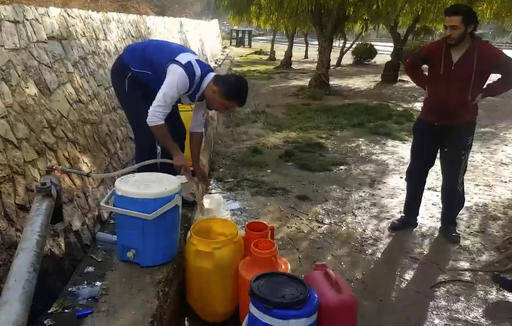Residents of Damascus are scrambling for clean water after the government attacked rebels holding the city's main source in a nearby valley, producing an outage that has stretched on for nearly two weeks.
The cut-off is a major challenge to the government's effort throughout the nearly 6-year-old civil war to keep the capital as insulated as possible from the effects of the conflict tearing apart much of the country.
The battle for resources has always been an undercurrent to the war. The government, in particular, has advertised its efforts to keep electricity and water flowing to areas under its control, while it blocks the U.N. and other relief agencies from supplying opposition zones.
But rarely has that struggle been so starkly felt inside the capital.
"I have stopped cleaning the house, washing dishes or clothes. We no longer take showers," said Mona Maqssoud, a 50-year-old resident of Damascus. She said residents have relied on water tankers that come by occasionally and give 20 liters (5 gallons) of water to each house, but that hasn't been enough.
"We begged the drivers (to return) to our neighborhood, but they refused."
The opposition has long controlled Wadi Barada, the valley northwest of Damascus through which the river of the same name flows to the capital. The government and the opposition had previously had an understanding to keep water services running. But that modus vivendi ended when forces of President Bashar Assad and his allies, the Lebanon Hezbollah guerrilla force, attacked the valley, home to some 100,000 people.
The cut-off, since Dec. 22, is the longest Damascus has seen, say residents, who are accustomed to intermittent outages.
The Barada River and its source, the Ain al-Fijeh spring, supply 70 percent of the water for Damascus and its environs. An activist-run media collective in the Barada Valley said government and Russian aircraft had bombed the Ain el-Fijeh water processing facility, puncturing its fuel depots and contaminating the water stream. The collective said the plant's electrical control systems had been destroyed as well. Images showed the roof of the facility collapsed into its main water basin. An activist with the group, Abu Mohammed al-Bardawi, said it would take at least two months to get the facilities working again.
Damascus officials said they shut off the water after opposition forces poured gasoline into the river. The government denied attacking the water processing facility, saying it would not set out to harm its own population. Still, it would not be the first time it strikes its own facilities: government strikes hit pumping stations in the northern city of Aleppo in April, September, and November.
Damascus, the seat of Assad's power, has been spared from the widespread destruction in other parts of the country, though rebels on the outskirts occasionally fire mortar rounds into the city. Hundreds of thousands of Syrians have flocked to the capital seeking its relative security, swelling its population to 4 million from 2 million, according to the UN.
For its residents, the water cuts are a grueling reminder of the war beyond.
"If this goes on, I will rent a room at a hotel just to take a shower," said a 60-year-old woman carrying a pair of buckets back to her apartment on the sixth-floor of a walk-up building. Like many others in the capital, she was filling her basins from distribution points at a parks and mosques. The local press is reporting soaring prices for unregulated private water.
Residents are making adjustments to cope. Some are now flushing their toilets with bottled water. Others are dining on disposable tableware as an alternative to doing the dishes.
Ground wells around Damascus, even at maximum capacity, can only cover about a third of the minimum water demand of around 600,000 cubic meters a day, according to UNICEF spokeswoman Juliette Touma.
The agency has rehabilitated some 200 wells around the capital since 2011, partially insuring the government against the effects of its own Barada Valley campaign. This year, UNICEF funded $50 million in water projects in Syria.
The Barada Valley is surrounded by all sides by the Syrian army and Hezbollah forces, according to the Syrian Observatory for Human Rights, which monitors the conflict.
Pro-government forces have kept up their assault with airstrikes, artillery and infantry pushes, despite a Russia and Turkey-brokered cease-fire that went into effect Friday. The government and the Observatory say fighters loyal to al-Qaida are present in the valley, and the militant are not included in the cease-fire. Local residents say there are no al-Qaida fighters in the valley.
"Most of the food depots have now been struck and burned," said al-Bardawi. "They are striking the schools we are using for shelters."
In early December, pro-government media reported efforts by officials to reach a so-called "reconciliation agreement" with the towns and villages of Barada Valley, under which thousands of dissidents, military defectors and draft-dodgers would leave in exchange for the valley submitting to government control.
The opposition and the U.N. have likened these sorts of agreements to forced displacement. Such deals were reached in other areas around the capital under the pressure of years of government bombardment and siege.
Barada opposition fighters and councils have held out against any settlement. Activists say they believe that prompted the renewed government assault.
Opposition forces have retaliated by choking a natural gas pipeline to Damascus to pressure the government to stop its offensive, compounding the woes of the resource starved capital. A group of rebels calling themselves the Coalition for the Joint Defense of Syria filmed themselves cutting the gas to the capital at an isolated station outside the capital Thursday.
Copyright 2017 The Associated Press. All rights reserved. This material may not be published, broadcast, rewritten or redistributed.








